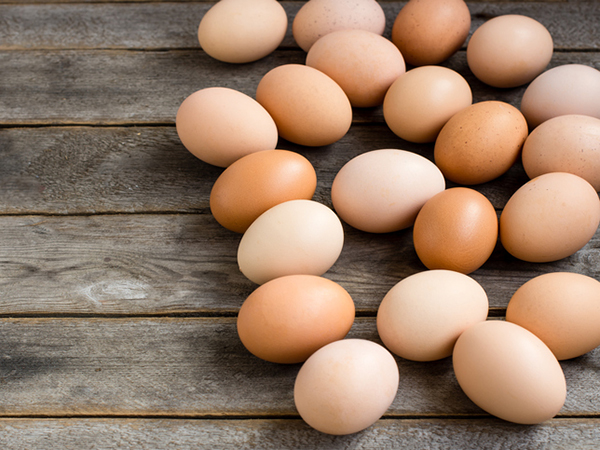Your Location:Home - Hot Topics > - Content
News and Information
Egg Essentials
Time:2017-04-18 11:22:53
Source:Academy of Nutrition and Dietetics

Eggs are front and center during Easter time. Hard-boiled, dyed and decorated eggs are a beloved Easter tradition. But are you up to speed on your egg expertise? Get the answers to these common egg questions.
Are Easter Eggs Safe to Eat?
Yes, as long as you store them in the refrigerator, hide them in places above the ground and away from bacterial sources such as pets and dirt, and toss any eggs that are cracked, dirty or have been out of the fridge for more than two hours. They also should be washed, re-refrigerated and used within one week to prevent food poisoning.
Better yet, minimize health risks by cooking two sets of eggs. Use one set for an Easter egg hunt or centerpiece display, and the other for eating. That way, the eggs you eat can stay properly refrigerated. Also consider using plastic eggs for hiding.
Are Eggs OK to Use after the "Sell By" Date?
Eggs should be purchased before the "sell by" date and used within three to five weeks of the purchase date. Store eggs in the refrigerator at less than 40°F. When purchasing eggs, make sure they are sold in a refrigerator case and that none of the eggs are cracked. When you get home, put the eggs in the refrigerator as soon as possible and keep them in their original carton displaying the expiration date. The egg rack on the refrigerator door is not the best place to store eggs because the temperature is warmer there than on the interior shelves.
How Do I Hard Boil an Egg?
Hard-boiled eggs should be cooked until the white and yolk are completely set. To do this, place eggs in a saucepan and cover with water. Bring water to a boil, cover the saucepan, then turn off the heat. Let eggs stand in water for 15 minutes. Remove eggs and place in a bowl of ice cold water to cool.
Do Hard-Boiled Eggs Spoil Faster than Fresh Eggs?
Yes. When eggs are hard boiled, the protective coating is washed away, making it easier for bacteria to permeate the shell and contaminate the egg. Hard-boiled eggs should be refrigerated within two hours of cooking and used within a week.
What Makes Hard-Boiled Eggs Hard to Peel?
The fresher the egg, the more difficult it is to peel after hard boiling. That's because the air cell, found at the large end of the shell between the shell membranes, increases in size the longer the raw egg is stored. As the egg's contents contract and the air cell enlarges, the shell becomes easier to peel. For this reason, older eggs are better candidates for hard boiling.
Why Is the Inside of a Hard-Boiled Egg Green?
A green ring on a hard-boiled yolk is a result of overcooking. It's caused by sulfur and iron compounds in the egg reacting on the yolk's surface. The green color can also be caused by a high amount of iron in the cooking water. The green-colored yolk is safe to eat.
Are Easter Eggs Safe to Eat?
Yes, as long as you store them in the refrigerator, hide them in places above the ground and away from bacterial sources such as pets and dirt, and toss any eggs that are cracked, dirty or have been out of the fridge for more than two hours. They also should be washed, re-refrigerated and used within one week to prevent food poisoning.
Better yet, minimize health risks by cooking two sets of eggs. Use one set for an Easter egg hunt or centerpiece display, and the other for eating. That way, the eggs you eat can stay properly refrigerated. Also consider using plastic eggs for hiding.
Are Eggs OK to Use after the "Sell By" Date?
Eggs should be purchased before the "sell by" date and used within three to five weeks of the purchase date. Store eggs in the refrigerator at less than 40°F. When purchasing eggs, make sure they are sold in a refrigerator case and that none of the eggs are cracked. When you get home, put the eggs in the refrigerator as soon as possible and keep them in their original carton displaying the expiration date. The egg rack on the refrigerator door is not the best place to store eggs because the temperature is warmer there than on the interior shelves.
How Do I Hard Boil an Egg?
Hard-boiled eggs should be cooked until the white and yolk are completely set. To do this, place eggs in a saucepan and cover with water. Bring water to a boil, cover the saucepan, then turn off the heat. Let eggs stand in water for 15 minutes. Remove eggs and place in a bowl of ice cold water to cool.
Do Hard-Boiled Eggs Spoil Faster than Fresh Eggs?
Yes. When eggs are hard boiled, the protective coating is washed away, making it easier for bacteria to permeate the shell and contaminate the egg. Hard-boiled eggs should be refrigerated within two hours of cooking and used within a week.
What Makes Hard-Boiled Eggs Hard to Peel?
The fresher the egg, the more difficult it is to peel after hard boiling. That's because the air cell, found at the large end of the shell between the shell membranes, increases in size the longer the raw egg is stored. As the egg's contents contract and the air cell enlarges, the shell becomes easier to peel. For this reason, older eggs are better candidates for hard boiling.
Why Is the Inside of a Hard-Boiled Egg Green?
A green ring on a hard-boiled yolk is a result of overcooking. It's caused by sulfur and iron compounds in the egg reacting on the yolk's surface. The green color can also be caused by a high amount of iron in the cooking water. The green-colored yolk is safe to eat.
Last articleThe Basics of the Nutrition Facts Label
Next articleCook Once, Eat Safely throughout the Week



